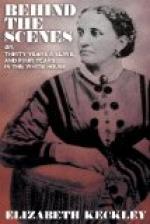“When I was sold from the Memphis trader’s yard I was bought by a man who lived not far from Memphis. I never heard of any of the children, and knew nothing as to what had become of them. After the capture of Memphis by the Union army, the people to whom I belonged fled from their home, leaving their slaves; and the other slaveholders of the neighborhood did the same. The slaves, left to themselves, at once departed for Memphis, and I among the number. When I had been there but a short time a call was made for nurses to go into the hospital; and, after thinking of it for a few minutes, I concluded to answer the call, and was speedily installed in the work. When I had been there a short time I found, to my great surprise and delight, my eldest daughter was also employed there. She had come to Memphis as I had, because her master’s family had fled; and, hearing the call for nurses, had entered the service at once. I can not tell my pleasure in meeting one of my children, for I had never expected to see any of them again. We continued our work in the hospital until Generals Sheridan and Grant said the city was getting too crowded with colored people—there was not room for them; some must be removed. So, large numbers of them were sent to Cincinnati, and my daughter and I were among them. This is why you see us here together.”
When she had finished telling this story my wife and I were shedding tears of joy. My sister-in-law, Mary Ellen, whom Boss bought at the same time that he bought my wife, was with us; thus the mother and three daughters had met again most unexpectedly, and in a way almost miraculous. This meeting again of mother and daughters, after years of separation and many vicissitudes, was an occasion of the profoundest joy, although all were almost wholly destitute of the necessaries of life. This first evening we spent together can never be forgotten. I can see the old woman now, with bowed form and gray locks, as she gave thanks in joyful tones yet reverent manner, for such a wonderful blessing.
* * * * *
In Canada.
We did not remain long in Cincinnati, as houses were so scarce we could not get a place to stop in. My wife’s mother had but one room, and we could not stay there. We went on to Hamilton, but stayed there only two months. I worked at whatever I could get to do—whitewashing and odd jobs of any kind. The women managed to get washing to do, so that we got on very well. Our aim was when we left Memphis to get to Canada, as we regarded that as the safest place for refugees from slavery. We did not know what might come again for our injury. So, now, as we had found some of my wife’s people, we were more eager to go; and, as I could not get any steady work in Hamilton, we made ready to move on. We went straight to Detroit, and crossed over the river to Windsor, Canada, arriving there on Christmas 1865. I succeeded in getting work




